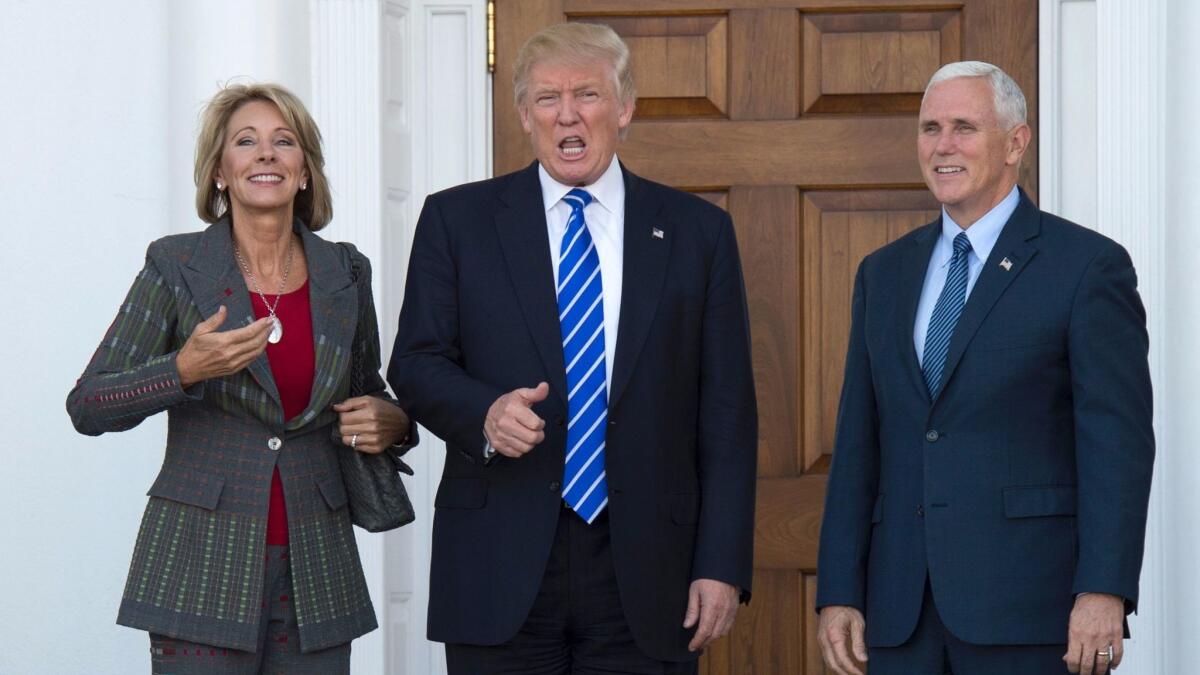Opinion: Trump’s transition picks are no surprise — they mirror today’s GOP

The Pew Research Center released its initial findings Thursday on Americans’ views of President-elect Donald Trump’s transition. The top-line message was that Trump’s overall approval numbers are lower than his predecessors’ were during their transitions. But a deeper dig into Pew’s numbers reveal the opposite to be true within his own party. Seventy-nine percent of Republicans or those who lean Republican are happy with Trump’s transition performance. That’s a higher Republican approval rating than either George H.W. Bush or George W. Bush got during their transitions. Two-thirds (67%) of Republicans and Republican leaners think Trump will make at least a good president, up from 54% in October.
Among the predecessors Trump was compared to — George H.W. Bush, Bill Clinton, George W. Bush and Barack Obama — only one also lost the popular vote: George W. Bush, who did so by a half a percentage point. As of the time this piece was written, Trump had lost the popular vote by 1.9 percentage points. With 46.3% of the popular vote, Trump took a smaller percentage of votes than any of those predecessors except Bill Clinton in 1992, when third-party candidate Ross Perot took 18.9% of the vote.
In other words, of course Trump’s overall approval rating is lower than it was for his predecessors. His predecessors each received a stronger mandate to lead.
During the campaign, I wrote about how Trump isn’t an aberration in the contemporary GOP, but a reflection of it. The 2016 Republican party platform takes incredibly strong stances, from building a wall that covers the entire Southern border to amending the Constitution in order to make abortion illegal. Much of the hemming and hawing from Republican Party leaders during the campaign was about Trump’s way of framing his beliefs rather than his beliefs themselves. Love or hate the player, he came from the game.
Look, party platforms are not influential at a national level. Few read them, and fewer still make voting decisions based on them. But they’re symbolically useful as an expression of values and beliefs. They’re an anchor that helps us push through campaign rhetoric to understand what, exactly, is being fought for by each side.
In the context of this year’s Republican Party platform, it’s depressing to watch the surprise unfolding at a national level with each of Trump’s Cabinet picks. On Thursday, a Washington Post article asked “Do Trump’s Cabinet picks want to run the government – or dismantle it?” Fun game for the end of days: Substitute “contemporary Republican Party” anywhere you read “Trump’s Cabinet” in the mainstream press, and see if it reads any differently.
If we’re waiting for the Republican Party to turn against Trump because of his more radical Cabinet picks, it may be time to revisit the platform it wrote.
Trump has appointed a mix of old-guard and contemporary Republican leaders to his Cabinet. Some, such as Trump’s choice for Labor secretary, millionaire fast-food franchiser Andrew Puzder, reflect the Republican Party’s long-held belief that the country can and should operate more like a business. Some, such as Trump’s chief strategist, Breitbart News’ Steve Bannon, reflect a radical contingency of the Republican Party that has grown in number during the Obama administration. Others, such as future Housing and Urban Development Secretary Ben Carson, represent only Trump’s loyalty to those who supported his campaign; like Trump himself, Carson has no credentials applicable to the post.
From the outside, it can look like Trump is pulling names out of a hat. But there are enough nods to the traditional Republican Party to keep them from revolting, enough to the alt-right to keep their hateful white dream alive, and enough left-field picks to keep the antiestablishment people sated.
Unlike prior presidents who promised the world on the campaign trail and tempered expectations during the transition, Trump has just kept going. In Ohio, he told supporters “It’s time to remove the rust from the Rust Belt and usher in a new industrial revolution,” the piece of his campaign that was perhaps the most widely criticized as being impossible due to increased globalization and technological advances. What’s not to love about an impossible promise?
And Trump has a way of explaining away fishy dealings with a tagline. “I want people that made a fortune, because now they’re negotiating for you,” he said in Iowa. The cognitive dissonance between “Drain the Swamp” and “Hand the Reins to Another Billionaire” doesn’t seem to bother Trump. His unwavering belief in his own sheer force of will to, for instance, create peace in the Middle East can be comforting on its face; he continues promising what he promised, just harder.
And he knows that only political pundits and career politicians are furrowing their brows about the transition’s internal squabbling. Trotting Mitt Romney out in front of the cameras was a campy show of Trump’s strength. It’s the very same kind of aggressive flourish that made him a successful TV boss. Go get China! Crush that labor leader! Make Mitt eat crow! Crowds are pitiless; they clap for blood.
If we’re waiting for the Republican Party to turn against Trump because of his more radical Cabinet picks, it may be time to revisit the platform its membership wrote. On Wednesday, Trump appointed Scott Pruitt, a climate change skeptic and Environmental Protection Agency critic, to run the EPA. On the environment, the platform states: “The central fact of any sensible environmental policy is that, year by year, the environment is improving. Our air and waterways are much healthier than they were a few decades ago. As a nation, we have drastically reduced pollution, mainstreamed recycling, educated the public, and avoided ecological degradation. Even if no additional controls are added, air pollution will continue to decline for the next several decades due to technological turnover of aging equipment. These successes become a challenge for Democratic Party environmental extremists, who must reach farther and demand more to sustain the illusion of an environmental crisis. That is why they routinely ignore costs, exaggerate benefits, and advocate the breaching of constitutional boundaries by federal agencies to impose environmental regulation.” This is what the Republican Party officially professes to believe; this is what Trump’s EPA pick believes.
Each of Trump’s Cabinet appointees has opposed LGBT rights. Of course they have. Regarding Obergefell vs. Hodges, the case that legalized same-sex marriage, the Republican platform states: “Five unelected lawyers robbed 320 million Americans of their legitimate constitutional authority to define marriage as the union of one man and one woman.” Therefore, Republicans (as a party) do “not accept the Supreme Court’s redefinition of marriage and we urge its reversal, whether through judicial reconsideration or a constitutional amendment returning control over marriage to the states. We oppose government discrimination against businesses or entities which decline to sell items or services to individuals for activities that go against their religious views about such activities.” In short: we want to reverse gay marriage, we want to nationalize the (now-blocked) Mississippi law that would allow businesses not to serve LGBT Americans.
Progressives may hang their heads in dismay after each of Trump’s new appointments, false statements or aggressive tweets. Television anchors may clutch their pearls while detailing some of his more outlandish or hateful picks’ resumes. But the fact remains that Trump is doing a wonderful job representing the contemporary Republican Party in all of its “diversity,” ranging from those who actively wish to deny the rights of marginalized Americans, to those who don’t care enough about protecting the rights of marginalized Americans to change their votes. Seventy-nine percent of Republicans recognize Trump’s accomplishment; that’s higher than Democrats’ approval of Clinton during his transition. Look how they show up for their people.
Trump deserves the high marks he’s earning among Republican Americans. He’s bringing their vision to life.
Melissa Batchelor Warnke is a contributing writer to Opinion. Follow her on Twitter @velvetmelvis.
More to Read
A cure for the common opinion
Get thought-provoking perspectives with our weekly newsletter.
You may occasionally receive promotional content from the Los Angeles Times.











